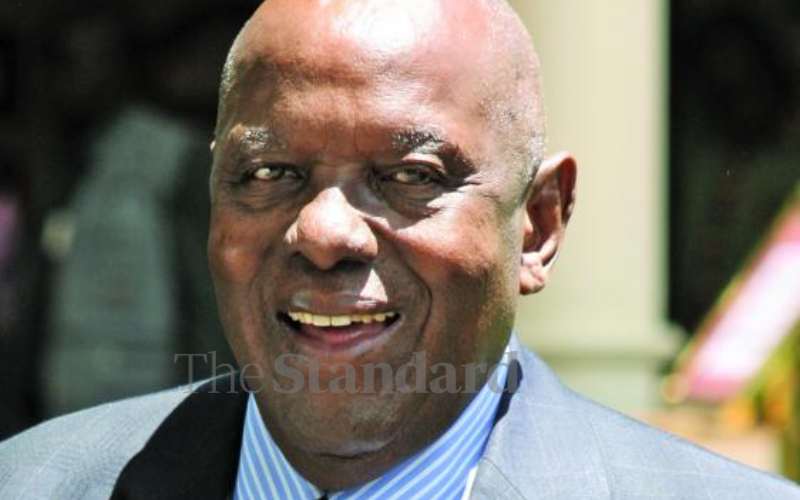
The Court of Appeal has stopped more than 1,300 coffee pickers from having their battle with late Cabinet Minister Njenga Karume (pictured) over a 518-acre piece of land worth Sh3 billion in Kiambu County heard by the Supreme Court.
According to Justices Wanjiru Karanja, Hannah Okwengu and Sankale Ole Kantai, the issues they want to raise before the highest court in the land are similar to what had been settled and there were no conflicting verdicts that would prompt the court to ask the Supreme Court to intervene.
“The identified issues do not raise any novel issues that have not been determined before nor is there in existence conflicting decisions arising from similar situations which will require the Supreme Court to address,” the court ruled.
This saga began when Ms Norah Fangor sold the piece of land and moved to Malindi where she died, leaving two warring factions, one led by former powerful minister Njenga Karume and the other consisting of coffee pickers, fighting over ownership.
The battle over Kiu River Farm involves Gitamaiyu Trading Farmers and the Nyakinyua Mugumo Kiambaa company and has outlasted the reigns of Presidents Jomo Kenyatta, Daniel Arap Moi and Mwai Kibaki, and spilt into President Uhuru Kenyatta rule.
The pickers first sought the President’s intervention and when that failed, they turned to the courts. The Gitamaiyu group, comprising 600 members, most of them landless, claimed they bought the expansive land, causing Mzee Kenyatta to summon Karume to State House Nakuru to explain what was happening.
In a letter dated August 15, 1977, by Francis Da Gama Rose and Company advocates and signed by the then Gitamayu chairman Njuguna Kaguima, treasurer Charity Wanjiku and Secretary Peter Waruinge, it was alleged that Fangor offered that to sell her land for the first time in 1973 at a cost of Sh1.5 million.
She allegedly raised the price one year later, in 1974, to Sh2 million, which Gitamayu members claimed they agreed to pay. Gitamayu alleges that they signed a sale agreement for the land in February 1977, but without transfer since Norah failed to sign land consent forms.
In total, Gitamaiyu claims they paid Sh1 million in cash to Fangor and the remaining cash in coffee picking dues.
But in a rebuttal, Karume claimed that the first sale proposal was to him in 1975 at Sh 2.68 million, which he was allegedly required to pay 10 per cent deposit within a day, which he did.
“I am replying to your letter dated January 3, 1980, which was attached with a petition by members of Gitamaiyu Trading Company Limited to His Excellency the President. The above farm was offered to me in 1975 at Sh 268,000 and the owner gave me one day to pay a 10 per cent deposit.
“I accepted the offer and promised to pay the deposit as required,” the late Karume explained to the District Commissioner in a letter dated January 30, 1981.
Karume said that he opted to look for potential groups which would buy the land but found none. He opted to ask Ite Farmers, whose membership incorporated some of his employees. He stated that two days after his proposal to Ite Farmers, Gitamaiyu directors approached him offering to refund his deposit as they had allegedly collected Sh300,000. They, however, did not honour their promise.
“They told me they had been collecting money to buy that farm on which some of their members lived as squatters,” Karume said.
He claimed that the seller returned his deposit and that he approached Kiambaa and Nyakinyua Women who were over 300 in number with an offer for the land.
The Gitamaiyu group claimed that Karume’s wife, Wariara Karume, was the chairperson of Mugumo Nyakinyua Farmers Company.
But in his letter, Karume denied that his wife Wariara was the chairperson of the Mugumo group. He said that she was only persuaded to become a shareholder by the women in the group, adding that some of the women were even linked to the Gitamaiyu one.
“After the women bought 100 per cent shares in the company, the directors of Gitamaiyu went to the late President and told him that I had denied them the right to buy the farm and instead bought it for myself.
“On coming back from overseas, I was called (sic) to Nakuru. I told him that this farm was bought by Mugumo Nyakinyua Kiambaa Co.Ltd,” the letter read.
According to Karume, Fangor died before signing the land consent form, but Charles Njonjo, who was minister for Home and Constitutional Affairs in President Moi’s Government at that time, allegedly intervened.
The standoff spilt into the courts in 1994 and was determined by High Court judge Aggrey Muchelule who dismissed Gitamaiyu’s case. They filed an appeal in 2013. The case is yet to be determined to date.
[email protected]
 The Standard Group Plc is a multi-media organization with investments in media
platforms spanning newspaper print operations, television, radio broadcasting,
digital and online services. The Standard Group is recognized as a leading
multi-media house in Kenya with a key influence in matters of national and
international interest.
The Standard Group Plc is a multi-media organization with investments in media
platforms spanning newspaper print operations, television, radio broadcasting,
digital and online services. The Standard Group is recognized as a leading
multi-media house in Kenya with a key influence in matters of national and
international interest.
 The Standard Group Plc is a multi-media organization with investments in media
platforms spanning newspaper print operations, television, radio broadcasting,
digital and online services. The Standard Group is recognized as a leading
multi-media house in Kenya with a key influence in matters of national and
international interest.
The Standard Group Plc is a multi-media organization with investments in media
platforms spanning newspaper print operations, television, radio broadcasting,
digital and online services. The Standard Group is recognized as a leading
multi-media house in Kenya with a key influence in matters of national and
international interest.










